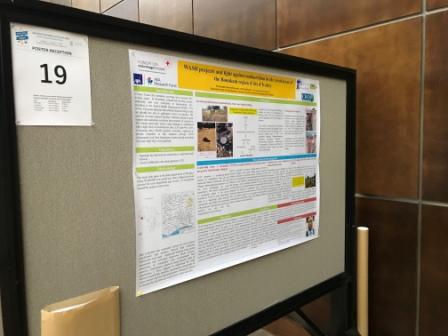Edouard Kouadio Kouassi, a sociologist and fellowship laureate from the Foundation, was selected to display his scientific poster at the international conference organized by the Water Institute of the University of North Carolina (UNC) at Chapel Hill in the United States last October. This conference is an annual reference event and the Kouassi’s participation was opened thanks to Jean-Marc Leblanc, Water, Sanitation and Hygiene (WASH) Project Manager at the DROI (International Relations and Operations Department of the French Red Cross). This pair work is a perfect illustration of the opportunities offered by collaboration between academics and practitioners. Jean-Marc Leblanc answers our questions.
Can you tell us about the special relationship you have with this research project?
Jean-Marc Leblanc – I have had the good fortune to accompany this research project since its genesis: we had suggested the research theme to the Foundation; Edouard Kouadio Kouassi was selected to carry out his study on this theme; I was his “sponsor” during his work and I was able to represent him at the Conference organized by the Water Institute of the University of North Carolina at Chapel Hill (UNC), administrative difficulties having prevented him from responding to the invitation of our American colleagues.
His research addresses the link between malnutrition, water and livestock. Indeed, some WASH interventions, in order to improve the health of populations, claim to eradicate open defecation, a source of transmission of waterborne diseases. On the other hand, in breeding areas, these interventions do not integrate the management of animal excrements, even though these are also carriers of certain pathogens that are also responsible for diseases. This is all the more problematic when we consider that certain germs spread by animal excrements and directly responsible for malnutrition problems are insensitive to chlorine, which is classically one of our best allies in improving the health of populations.
The subject is just beginning to be documented. With his sociologist’s viewpoint, Edouard’s research brings new elements, and in particular has highlighted the inhibitor to behavioural change that hinder the full achievement of WASH project objectives. Precise knowledge of these obstacles should enable us to transform them into levers for changing practices, and to imagine solutions adapted to the local context and to the reasons, not always rational for laymen, farmers and populations. It is a real satisfaction to have been able to enrich our technical knowledge with a sociological approach.

How was Kouassi’s research perceived at this Conference?
JML – This invitation marked the interest that Anglophone researchers have in Francophone research, which is conducted, moreover, by an academic from the Global South, whose work is often the least funded. Edouard analyzes fields they know little about with a different perspective. In fact, Edouard’s scientific poster aroused a great deal of interest and raised a number of questions. In particular, the link established between animal dejecta and malnutrition has been criticised. For many, malnutrition is “multifactorial”, an argument that casts doubt on any scientific research aimed at identifying specific causes. Moreover, Edouard’s criticism of the shortcomings of the Community Led Total Sanitation (CDTA) approach did not necessarily please his defenders. In short, his work has not left anyone indifferent and has given rise to very interesting exchanges.
You therefore seem to be particularly satisfied with the collaboration between the DROI and the Foundation. Do you have other projects in view?
JML – Our joint participation in the conference and all the opportunities it provides are already, in themselves, a satisfaction. Regarding ouf field actions, we are also convinced of the value of enriching our knowledge and strengthening our capacity for action through research. The social science approach allows us to better take into account the social, societal and cultural issues of our interventions. Applied research provides a time for reflection that we often lack in the heat of action, and gives a solid, scientific basis for what we perceive or sense.
A certain misunderstanding sometimes appears between researchers and humanitarians, the latter feeling sometimes unfairly judged by the former. In the work with Edouard and the Foundation, on the contrary, a virtuous circle has developed in which complementarity and cooperation have prevailed. We sincerely hope to continue this dynamic on new projects.





